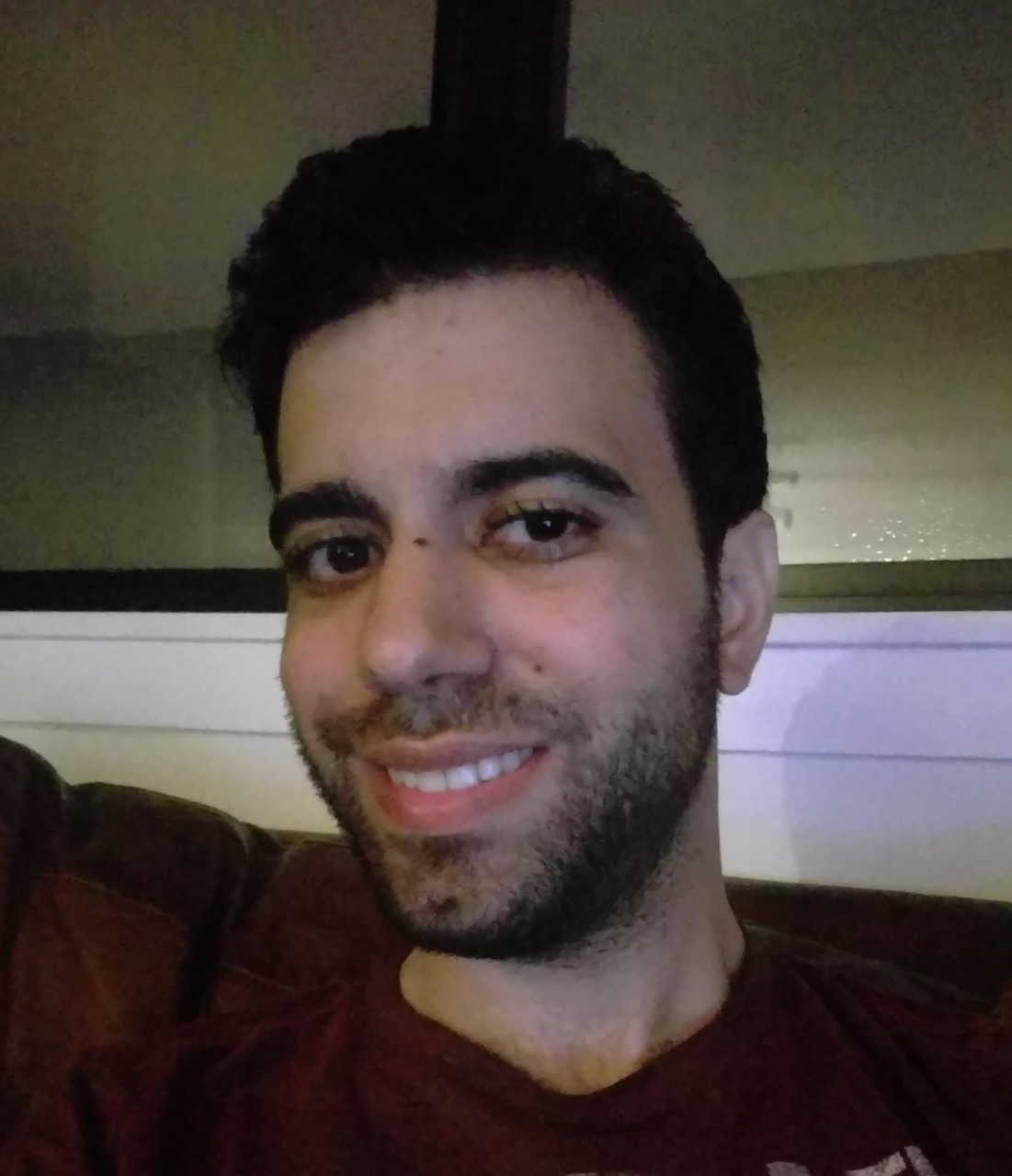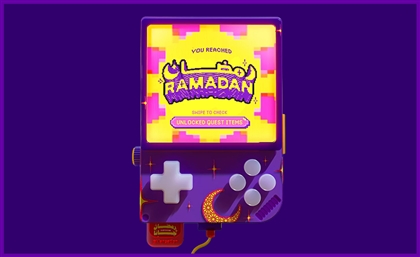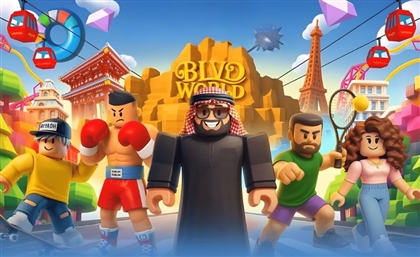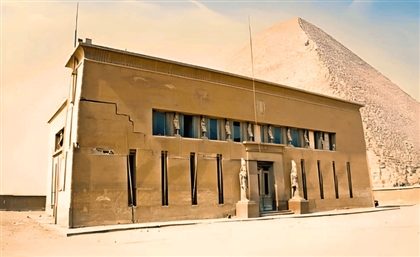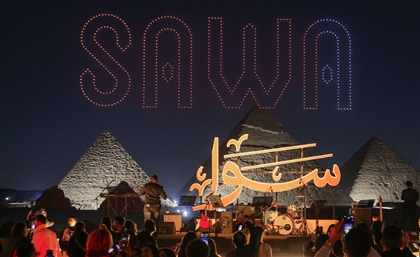Starvania: The Saudi Indie Gaming Startup With Global Ambitions
With a game released on PC and a planned launch on the Nintendo Switch, Starvania is serving as an example for how small Saudi developers can make a global impact.
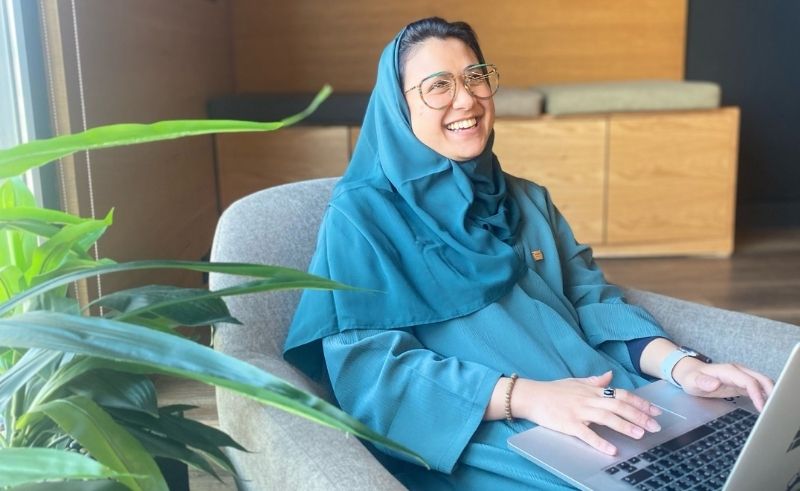
In the public eye, video game development has held long-standing geographical borders over the decades - countries like Japan and the United States were thought of as the default for the industry, the places that came to everyone's minds when they looked for the epicentres of game creation, publishing and consumer culture. After all, where does a Nintendo come from? Who builds an Xbox?
It's only recently that a shift could be observed all over the globe, with the MENA region - and Saudi Arabia in particular - very swiftly finding a foothold in this new paradigm. You only need to look to the numbers to see how real this trend is. The Public Investment Fund-owned Savvy Games Group announced its plans to invest over $37 billion in the gaming sector. In 2024, the Kingdom inaugurated the Esports World Cup with a $60 million prize pool, the largest in esports history, only topped by the competition's second edition in 2025 at $70 million. Private Saudi-based VC Impact46 has recently invested over $59.6 million in Kammelna, the developers behind the popular playing card game Kammelna Baloot, which draws over a million monthly active players. It's all part of Saudi Arabia's Vision 2030 National Gaming and Esports Strategy, announced in 2022 to transform the Kingdom into a global hub for gaming.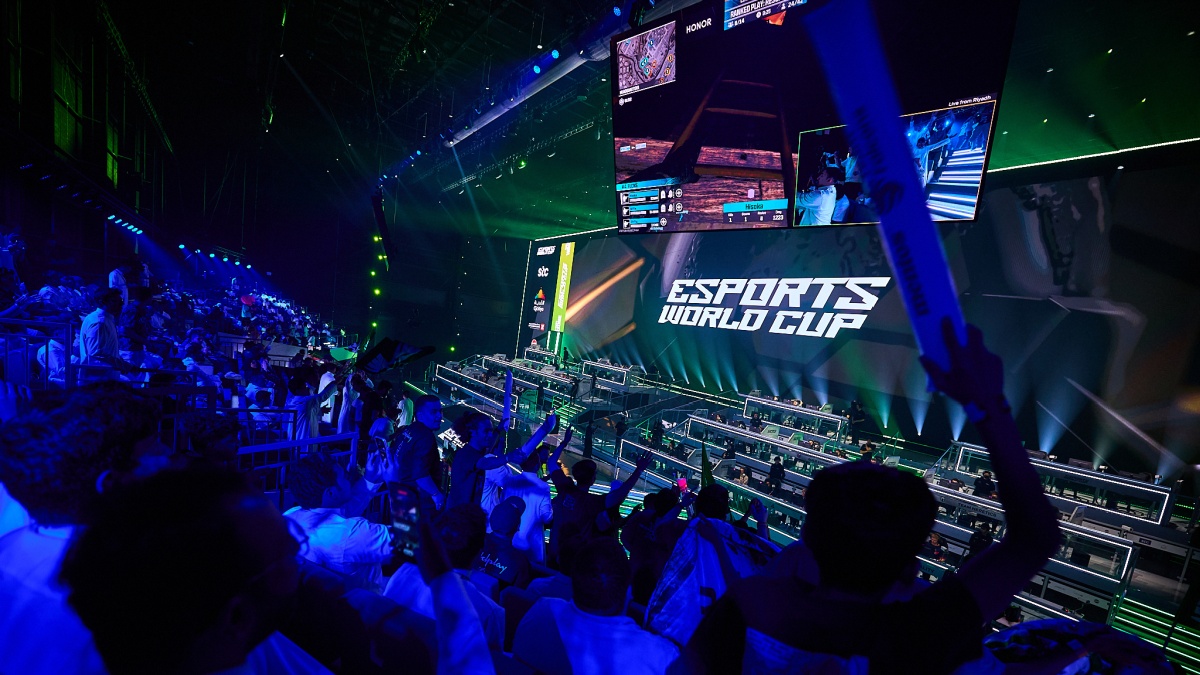 Amidst this national transformation, some are seeing an opportunity to elevate the indie gaming scene in the Kingdom; one that had existed for years before the government had ever made its ambitions known to the world. Made up of small teams of developers, they have been quietly working amongst themselves, organising hackathons and slowly building a foundation for the dedicated and the obsessed. The special thing about indie games is that a hit can truly come from anywhere - all that is required is that they find the right audience and accrue enough attention. For every popular US-made indie game like 'Undertale' and 'Shovel Knight', you can find a 'Hollow Knight' from Australia, a 'Disco Elysium' from Estonia, or a 'No Straight Roads' from Malaysia, all finding a fanbase around the world. With funding, events and opportunities becoming more available than it ever was in Saudi Arabia, it was time for its indie crowd to - as they say - level up.
Amidst this national transformation, some are seeing an opportunity to elevate the indie gaming scene in the Kingdom; one that had existed for years before the government had ever made its ambitions known to the world. Made up of small teams of developers, they have been quietly working amongst themselves, organising hackathons and slowly building a foundation for the dedicated and the obsessed. The special thing about indie games is that a hit can truly come from anywhere - all that is required is that they find the right audience and accrue enough attention. For every popular US-made indie game like 'Undertale' and 'Shovel Knight', you can find a 'Hollow Knight' from Australia, a 'Disco Elysium' from Estonia, or a 'No Straight Roads' from Malaysia, all finding a fanbase around the world. With funding, events and opportunities becoming more available than it ever was in Saudi Arabia, it was time for its indie crowd to - as they say - level up.
One of the up-and-coming players in the Saudi indie development scene is Starvania, a studio that has made headlines this year with the release of their fully-realised game, 'Bahamut and the Waqwaq Tree'. Founded by CEO Meaad Aflah and Creative Director Muslih Alzahrani in 2022, Starvania recently received $1.1 million in funding from Impact46 and Merak Capital, and appeared at an Esports World Cup event to represent Saudi indie creators and generate awareness of local game development in 2025. Prior to this, they won Best Game Startup at the MENA Games Industry Awards, and won the Graphics Galore prize at the Devcom Indie Awards in 2024.
-6766fe62-11f9-4641-9fec-aee86a2954be.jpg) Having come out on PC in May 2025, with a planned release on the Nintendo Switch at a later date, 'Bahamut and the Waqwaq Tree' sees you control a mythological creature as you dive into the darkest depths of an underwater world to help restore light to the realm. The game draws inspiration from Arab cultural elements, including old novels and historical architecture to build the look and feel of the world. "We did a lot of deep diving to bring authentic Arabic and regional cultural elements into 'Bahamut and the Waqwaq Tree'," Aflah and Alzahrani tell StartupScene. "You can see that influence in the flowing, calligraphy inspired gameplay, the underwater cities shaped by Middle Eastern design, and even in some playful touches like a sea turtle with camel features. The music also mixes instruments like the oud with more modern tones, and the story takes inspiration from classic tales like 'One Thousand and One Nights'."
Having come out on PC in May 2025, with a planned release on the Nintendo Switch at a later date, 'Bahamut and the Waqwaq Tree' sees you control a mythological creature as you dive into the darkest depths of an underwater world to help restore light to the realm. The game draws inspiration from Arab cultural elements, including old novels and historical architecture to build the look and feel of the world. "We did a lot of deep diving to bring authentic Arabic and regional cultural elements into 'Bahamut and the Waqwaq Tree'," Aflah and Alzahrani tell StartupScene. "You can see that influence in the flowing, calligraphy inspired gameplay, the underwater cities shaped by Middle Eastern design, and even in some playful touches like a sea turtle with camel features. The music also mixes instruments like the oud with more modern tones, and the story takes inspiration from classic tales like 'One Thousand and One Nights'."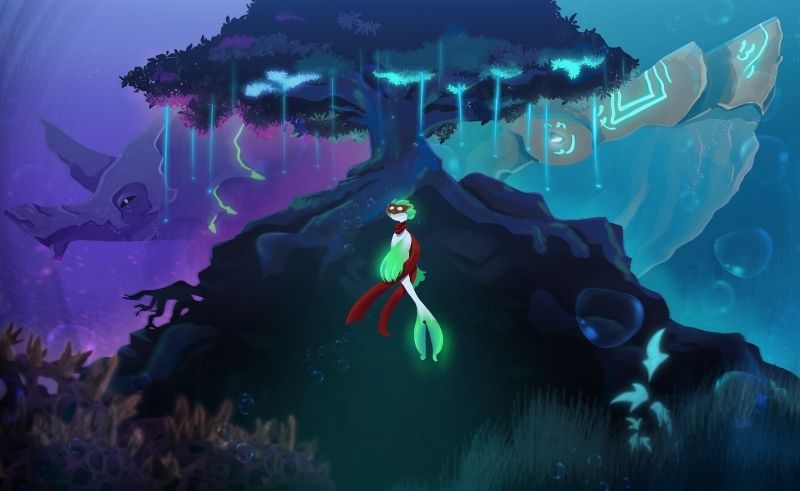 'Bahamut and the Waqwaq Tree' is all about diving deep into a vast environment, and for a game like that, it all begins with nailing down the movement of the player character. "The earliest inspiration for 'Bahamut and the Waqwaq Tree' came from experimenting with simple swimming mechanics, particularly drawing influence from 'Rayman Legends' and 'Rayman Origins'. These games had beautifully fluid underwater movement, which sparked the initial direction for the project," Aflah and Alzahrani share. "Over time, the idea naturally evolved. One major addition was the drawing mechanic, a feature that became central to the gameplay experience. The result was a fluid, cohesive gameplay loop centered around smooth underwater movement and expressive interaction through drawing, a concept that also ties deeply into the cultural influence of Arabic calligraphy."
'Bahamut and the Waqwaq Tree' is all about diving deep into a vast environment, and for a game like that, it all begins with nailing down the movement of the player character. "The earliest inspiration for 'Bahamut and the Waqwaq Tree' came from experimenting with simple swimming mechanics, particularly drawing influence from 'Rayman Legends' and 'Rayman Origins'. These games had beautifully fluid underwater movement, which sparked the initial direction for the project," Aflah and Alzahrani share. "Over time, the idea naturally evolved. One major addition was the drawing mechanic, a feature that became central to the gameplay experience. The result was a fluid, cohesive gameplay loop centered around smooth underwater movement and expressive interaction through drawing, a concept that also ties deeply into the cultural influence of Arabic calligraphy."
The design reflects a wider philosophy behind Starvania's creations: to create immersive worlds that bring you, as their motto says, 'Beyond the Horizon'. To this end, they built a locale that both reflects their own culture while taking global audiences into consideration. "We knew that not everyone would be familiar with these myths, so our goal was to make the experience accessible and inviting. Players can jump right in and enjoy the atmosphere, the mechanics and the humour, while those who want to dig deeper will find lots of cultural details layered into the game."
Since finding their footing on the PC, the Starvania team has been working on the game's upcoming Switch release. "It really is a very exciting step for us. Growing up with Nintendo, seeing 'Bahamut and the Waqwaq Tree' heading to the Switch feels almost surreal, like a childhood dream turning into reality," Aflah says. "What made the process smoother for us as a studio was our publishing deal, since our publisher took care of the entire porting and certification process with Nintendo. That allowed us to stay focused on the creative vision and overall polish of the game, while still learning a lot from how Nintendo’s pipeline works. For us, launching on Switch isn’t just about this one game, it’s a milestone that proves a Saudi indie studio can reach global platforms with the right partnerships."-39c849e6-ee79-48a4-9fba-245c72835cd1.jpg) This milestone did not come easy. Before they could even think about creating 'Bahamut and the Waqwaq Tree', before they could even imagine that it would be released on one of the most best-selling gaming consoles in history, the team behind Starvania had to find themselves - in more ways than one.
This milestone did not come easy. Before they could even think about creating 'Bahamut and the Waqwaq Tree', before they could even imagine that it would be released on one of the most best-selling gaming consoles in history, the team behind Starvania had to find themselves - in more ways than one.
Aflah and Alzahrani each started making a name for themselves by participating in game jams, events where developers attempt to create a game from scratch within a limited time frame. "They played a huge role in shaping my journey as a game developer. Events like Game Zanga and other regional hackathons are incredibly valuable because they give aspiring creators a safe space to experiment, collaborate, and showcase ideas quickly," Aflah says. "For many developers in the region, these events are the first step into the industry. You don’t need a big budget or a huge team, just creativity and passion. That accessibility is what makes them so powerful. They also foster a real sense of community." These events were also opportunities for self-expression and branding within a public space; during one such game jam, Alzahrani created a game to show support for the Palestinian conflict.-a876a20d-061d-4605-81ab-905a79ec1a05.jpg) After independently gaining experience both alone and in various hackathons, Aflah and Alzahrani first met during the Game Changers apprenticeship programme in Saudi Arabia, where they connected over their shared vision. Since then, the team has expanded to include not just other fellow Saudi creators, but a larger team of around a dozen artists and programmers from beyond the Kingdom, including Germany, France, Morocco, Pakistan, the UK and Palestine. Yet this journey of self-discovery did not end with the personnel - they had to establish their identity within the larger gaming ecosystem.
After independently gaining experience both alone and in various hackathons, Aflah and Alzahrani first met during the Game Changers apprenticeship programme in Saudi Arabia, where they connected over their shared vision. Since then, the team has expanded to include not just other fellow Saudi creators, but a larger team of around a dozen artists and programmers from beyond the Kingdom, including Germany, France, Morocco, Pakistan, the UK and Palestine. Yet this journey of self-discovery did not end with the personnel - they had to establish their identity within the larger gaming ecosystem.
"Many studios in Saudi Arabia and across the MENA region have gravitated toward mobile games," Aflah explains. "They’re faster to develop, require smaller budgets, and can yield strong returns if they succeed. From a business perspective, they can definitely feel like the safer bet. At Starvania, though, we’ve always believed in the long-term value of building larger-scale, console and PC experiences. Yes, it comes with a higher level of risk in terms of cost and time, but it also offers the opportunity to create something with longer-lasting impact, deeper engagement, and global reach."-2431fa1c-6ca9-4f46-90f5-79eef2b67cf2.jpg) It's by firmly establishing this identity that Starvania was able to win a number of awards for their work in the indie sphere, and leverage that towards a wealth of opportunities, including their appearance at the Esports World Cup to represent Saudi game creators at a special event, as well as their recent influx of funding from Impact46. "That investment came as a result of a long journey we’ve been on at Starvania,” Aflah explains. “Leading up to the investment, we had been steadily building credibility, not just through our creative direction and development progress, but also through the way we positioned ourselves as a Saudi indie studio with ambitions to deliver experiences beyond the horizon, particularly on PC and consoles. The partnership with Impact46 came after extensive conversations about where the games industry is headed, and how we could bring something different to players."
It's by firmly establishing this identity that Starvania was able to win a number of awards for their work in the indie sphere, and leverage that towards a wealth of opportunities, including their appearance at the Esports World Cup to represent Saudi game creators at a special event, as well as their recent influx of funding from Impact46. "That investment came as a result of a long journey we’ve been on at Starvania,” Aflah explains. “Leading up to the investment, we had been steadily building credibility, not just through our creative direction and development progress, but also through the way we positioned ourselves as a Saudi indie studio with ambitions to deliver experiences beyond the horizon, particularly on PC and consoles. The partnership with Impact46 came after extensive conversations about where the games industry is headed, and how we could bring something different to players."-434d4a5d-88a7-4484-9c51-2adc99467bea.jpg)
Such investments gave Starvania the resources and stability to scale up their production quality, expand their team, and accelerate development timelines. It has also allowed them to invest in areas like global publishing, marketing, and building a sustainable pipeline for future projects, rather than focusing only on one game at a time.
"Most importantly," Aflah says, "this investment validates our vision, that even as an indie studio from Saudi Arabia, we can create globally relevant experiences. It motivates us to think bigger, while still staying true to our identity and creative values." The Starvania team has always kept their finger on the pulse of the indie gaming scene - and they have high hopes for its future. "I think the scene is still in its early stages, but it’s moving in a really exciting direction," Alzahrani says. "Creatively, there’s so much untapped potential, developers here are experimenting with new ideas, often drawing from our own culture and stories, which gives the games a fresh identity you don’t see everywhere else.
"On the economic side, it’s still developing," he continues. "Funding, publishing opportunities, and market reach can be challenging compared to more established regions. But with more government initiatives, community events, and international interest, we’re starting to see a real foundation being built. It’s not fully formed yet, but there’s momentum."
- Previous Article Cairo Food Week Brings Global Chefs to the City’s Tables
- Next Article Arab Conference on Intellectual Property to Be Held in Sharjah
Trending This Week
-
Feb 23, 2026







